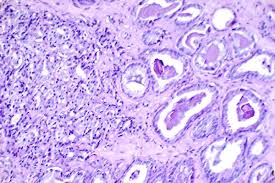Radiation Therapy Improves Radiographic Progression-Free Survival in Low-Volume mCSPC
 Adding radiation therapy with intensified systemic treatment using abiraterone improved radiographic progression-free survival (rPFS) and metastatic castration-sensitive prostate cancer (mCSPC)–free survival in men with low-burden disease. The results from the phase 3 randomized PEACE-1 trial establish a role for radiation therapy (RT) in the prevention of serious genitourinary (GU) events, irrespective of the metastatic burden. In addition, RT may be considered in selected men with high-burden mCSPC.
Adding radiation therapy with intensified systemic treatment using abiraterone improved radiographic progression-free survival (rPFS) and metastatic castration-sensitive prostate cancer (mCSPC)–free survival in men with low-burden disease. The results from the phase 3 randomized PEACE-1 trial establish a role for radiation therapy (RT) in the prevention of serious genitourinary (GU) events, irrespective of the metastatic burden. In addition, RT may be considered in selected men with high-burden mCSPC.
Based on these results, “a triplet of androgen deprivation therapy (ADT) plus abiraterone and prostate RT should be considered a standard treatment in men with low-burden mCSPC,” said Alberto Bossi, MD, of Gustave Roussy, Amethyst RT Group, France. “The effect of these therapies is additive.”
PEACE-1 was conducted with a 2 × 2 factorial design at hospitals across Belgium, France, Ireland, Italy, Romania, Spain, and Switzerland. Eligible patients had histologically confirmed or cytologically confirmed de novo mCSPC, which represents about 10% of patients treated for prostate cancer, according to Dr Bossi. A total of 1,172 men were randomly assigned in a 1:1:1:1 ratio to standard of care (ADT alone or with IV docetaxel 75 mg/m2 once every 3 weeks), standard of care plus RT, standard of care plus 1,000 mg daily of oral abiraterone plus oral 5 mg of prednisone twice daily, or standard of care plus RT (74 Gy in 37 fractions) plus abiraterone. Docetaxel was added to standard of care in 2017 through an approved amendment.
The experimental treatments were administered until disease progression or intolerance. The coprimary endpoints were rPFS and overall survival (OS).
Results were stratified according to volume of disease “because we understood from the moment that the trial was started that metastatic prostate cancer should be distinguished into low-volume and high-volume disease,” Dr Bossi said.
At baseline, disease volume was low in 505 participants and high in 667 participants. Metastatic sites in the low-volume population were lymph nodes only in 16.6%, bone only in 82.0%, and visceral in 1.3%. In the low-volume population, half of the participants in each treatment arm (standard of care with or without abiraterone and standard of care with or without abiraterone plus RT) received docetaxel as part of their regimen. The data presented were in the group with low-volume disease.
Low-volume participants randomly assigned to the 2 experimental treatments, abiraterone and RT added to standard of care, had statistically superior rPFS outcome compared with standard of care (reference group) at approximately 7 years post-randomization (global P < .0001). Although no difference in OS has been detected, median OS has not been reached in the triplet arm, whereas the other 3 groups have a median OS that ranges from 5.8 to 7.1 years.
In the low-volume population, serious GU events were less frequent in patients randomly assigned to RT (198 patients) compared with no RT (200 patients)—24 total events versus 52 total events (P = .0006). Specifically, 6 patients assigned to RT required a urinary catheter compared with 9 who did not receive RT, and prostate RT or transurethral resection of the prostate (TURP) was performed in 4 patients assigned to RT (all TURP) versus 27 who did not undergo RT. The triplet arm had the fewest serious GU events (6 patients) compared with 20 in the standard of care plus abiraterone arm, 18 in the standard of care plus RT arm, and 32 in the reference group (global P = .0001).
Superiority of the triplet on the rate of serious GU events was also apparent in the overall study population (global P < .0001).
“We found a role for RT in the prevention of serious GU events, irrespective of a metastatic burden and diagnosis, and this per se may justify the use of preventive prostate RT in this group of men with mCSPC,” Dr Bossi concluded. “This effect appears to be additive to the effect of abiraterone. It’s also important to state that our data show that prostate RT may significantly delay the onset of the castration-resistance state, again irrespective of the metastatic burden and diagnosis.”
In the low-volume population, median castration resistance-free survival was 2.5 years in participants assigned to standard of care with or without abiraterone versus 3.5 years in those who had RT added to standard of care with or without abiraterone (P = .007). In the overall population, median castration resistance-free survival was 1.9 versus 2.5 years, respectively (P = .007).
Adding RT on top of standard of care did not translate into more toxicity, he said.